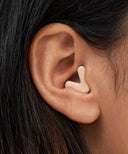Focus! Sometimes you need it and yet can't find it anywhere. In our noisy world, it can be increasingly difficult to find and maintain your focus. Noise is all around us: devices buzzing, conversations, your phone beeping, traffic or a noisy classroom. Whether you work in an open-plan office, study in the library or have a child who has difficulty concentrating at school: noise has a huge impact on your ability to concentrate.
Effective hearing protection for focus, such as earplugs or noise-cancelling earmuffs, helps reduce distractions and improve your attention span. Discover how noise affects your brain and how you can improve your own and your child's focus in a variety of situations.
What are the causes of difficulty concentrating?
Difficulty concentrating takes many forms. In children, you often notice it because they struggle to keep their attention focused on things, are easily distracted or fail to complete tasks. Adults are more likely to experience mental turmoil, forgetfulness or reduced productivity. Difficulty concentrating has multiple causes:
-
Too many stimuli around you
-
Fatigue or sleep deprivation
-
Stress and mental overload
-
An unhealthy lifestyle
-
Medical conditions such as ADD, ADHD, hormonal fluctuations
-
No clear purpose or a lack of structure
-
Use of medication or sedatives
How does noise affect your ability to concentrate?
Noise is one of the most underestimated causes of an impaired focus. The brain is constantly processing stimuli, even if you don't consciously notice them. Noisy environments disrupt that processing and reduce the effectiveness of your ability to concentrate. Even background noise such as talking, the tapping of a keyboard or street noise can lead to mental fatigue. With hearing protection, you filter these stimuli, so your brain uses less energy.
Common symptoms of children with difficulty concentrating
In children, difficulty concentrating is often visible in their behaviour. They find it hard to sit still, react impulsively or their attention wanders at the slightest noise. Especially at school, where they are exposed to multiple stimuli, this can lead to learning difficulties or frustration. Earmuffs or earplugs can help children improve their attention span. They provide greater focus and concentration, especially during tests or when working on individual assignments.
What role do the processing of stimuli and ADHD play?
Children (and adults) with ADHD or sensory processing difficulties are extra sensitive to noise stimuli. They process noise less efficiently, so their attention span is shorter. In this case, it's important to muffle stimuli without shutting out the surroundings completely. Special noise-cancelling earmuffs for children or earplugs that reduce background noise are ideal for this.
How do you improve your concentration in different environments?
Whether you are at home, in the office or at school, the right strategy and hearing protection can help you maintain your focus and improve your performance.
Improving concentration at school
In a classroom, even the slightest noise can be distracting. The scraping of chairs, tapping on tables or murmur of voices. A growing number of schools are turning to aids such as earmuffs to improve children's concentration. Take the Alpine Muffy Kids earmuffs, for example. These help children shut out distracting noises when they're working on individual assignments or during tests.
Working from home and maintaining focus
Working from home sounds great in theory but the reality is often different. The washing machine is beeping, the neighbours are doing DIY, or your children are playing in the next room. A low-stimulus environment is essential to staying focused for long periods. Noise-cancelling earmuffs or effective Silence earplugs can make all the difference. When working from home, it also helps to schedule fixed periods of time for working, in which you deliberately choose a quiet space with minimal distractions. With the right hearing protection, you increase your chances of getting and more importantly staying in a good working groove.
Noise in offices: what can you do?
Open-plan offices are notorious for being a distracting environment. Colleagues on the phone, meetings or people walking past your desk. The brain has to process all these stimuli, at the expense of your concentration and focus. A good solution is to wear discreet earplugs that muffle distracting background noise but still keep conversations audible. This not only improves your focus but also your comfort on long working days. Noise-cancelling earmuffs also help to temporarily disconnect you from your surroundings without shutting you out completely.
What helps when you have trouble concentrating?
In brief, these are the most important factors for improving your ability to concentrate and focus:
-
Recognise the cause of the distraction: noise stimuli are often the culprit.
-
Use hearing protection such as earplugs or noise-cancelling earmuffs, depending on the environment.
-
Adjust your environment: work in silence, listen to soothing music or make sure you have a quiet place for yourself.
-
Schedule your working time smartly: work for periods of 25–45 minutes with short breaks. This way, you ensure extra focus.
-
Pay attention to your mental and physical health: getting enough sleep and exercise and eating properly are the basis for being able to focus properly. Don't fret too much and take enough of these steps. In doing so, you also take steps towards improving your focus.
FAQs on improving focus and concentration
How does hearing protection help improve concentration?
Hearing protection, such as earplugs or noise-cancelling earmuffs, reduces annoying ambient noise. They reduce the number of stimuli your brain has to process, which helps you focus better and stay concentrated for longer.
When are noise-cancelling earmuffs suitable for children?
Noise-cancelling earmuffs are ideal for children who are easily distracted at school, for example during tests or when working on individual assignments. Earmuffs can also provide calm and focus for children with ADHD without completely shutting them out of what's going on in the classroom.
What are the main causes of difficulty concentrating?
Difficulty concentrating can be caused by too many stimuli, fatigue, stress, an unhealthy lifestyle, medical conditions such as ADHD or a lack of structure. Noise also often plays a major role.
How do I improve my focus when working from home?
Choose a quiet workplace, schedule fixed periods of time for working and use hearing protection such as earplugs or noise-cancelling earmuffs. This will help you reduce any distractions from household or ambient noise and increase your productivity.




